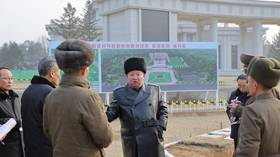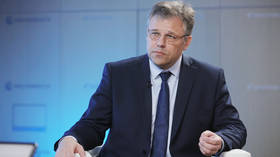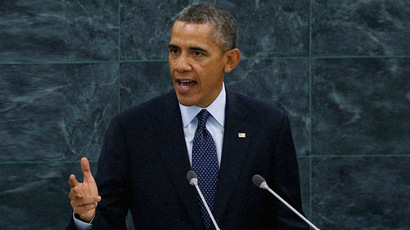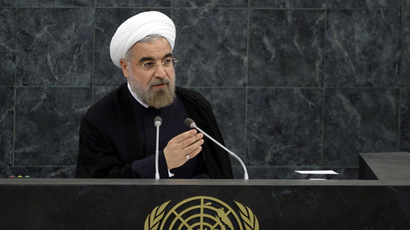‘Substantial’ Iran nuclear talks set ground for ‘tangible results’ at next P5+1 meeting
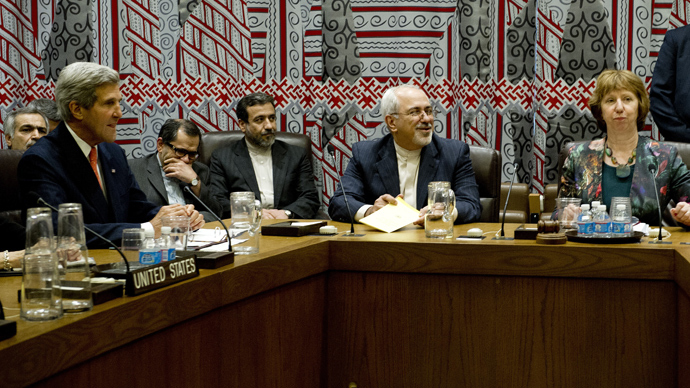
A sense of enthusiasm and caution has overcome members of the P5+1 delegation following a historical discussion on Iran’s nuclear program on the sidelines of the UN General Assembly in New York. The next round of negotiations is scheduled in October.
The meeting marked the highest-level direct contact between
representatives of Iran and US in six years, as diplomatic
relations between the two states broke down following the 1979
Islamic Revolution.
For the first time, US Secretary of State John Kerry sat next to
the Iranian Foreign Minister Mahammad-Javad Zarif in the company
of the EU’s chief diplomat Catherine Ashton and delegates from
the five permanent members of the Security Council plus Germany.
The meeting chaired by Ashton proved to be "substantial"
and has paved the road to a new set of negotiations of P5+1 next
month.
Speaking after the landmark discussions, Ashton told reporters
that participants agreed to "go forward with an ambitious
timeframe." The negotiators on the issue will meet in Geneva
on October 15-16.
Kerry welcomed the new positive tone from Iran after meeting
one-on-one with his Iranian counterpart. But he cautioned that
one meeting will not resolve international concern about Iran's
nuclear ambitions. He said more transparency is needed from the
Islamic Republic.
"Needless to say, one meeting and a change in tone, which was
welcome, doesn't answer those questions yet and there is a lot of
work to be done," Kerry told the press.
British Foreign Secretary William Hague said there had been a
"big improvement in the tone and spirit" compared with
previous representatives of the Iranian government. German
Foreign Minister Guido Westerwelle concurred, saying discussions
had a "completely different tone, atmosphere and
spirit" highlighting that a "window of opportunity
has opened" to negotiate a deal.
The Iranian foreign minister was also “satisfied” with the
meeting, saying that the goal of Iran is the removal of
sanctions.
“Now we have to see whether we can match our positive words with
serious deeds so we can move forward," Zarif told reporters.
"Of course as we move forward, there has to be removal of
sanctions and in the end game there has to be a total lifting of
all sanctions and both bilateral sanctions, unilateral sanctions
as well as multilateral sanctions and UN sanctions and we hope to
be able to move in that direction within a short span of
time."

"Words are not enough," Westerwelle said.
"Actions and tangible results are what counts. The devil is in
the detail, so it is now important that we have substantial and
serious negotiations very soon."
With the change of the Iranian leadership, the US hopes to
conduct new diplomatic rounds of negotiations which were started
by P5+1 in 2006, but so far have ended in stalemate.
"We hope that this new Iranian government will show that it is
prepared to engage substantively to address these long standing
concerns and we will see today and in months ahead whether they
will follow words with action," US State Department official
told AFP.
Iran, under the new leadership of President Rouhani has on a
number of occasions showed the willingness to cooperate. On
Wednesday Rouhani hinted that a deal could be struck within three
to six months.
However, speaking to the UN General Assembly for the second time
this week, Rouhani urged Iran’s nemesis Israel to sign the
Nuclear Non-Proliferation Treaty and called for the creation of a
nuclear-free zone in the Middle East.
"No nation should possess nuclear weapons, since there are no
right hands for these wrong weapons," Rouhani said.
On Friday, Iran and the International Atomic Energy Agency (IAEA)
held in Vienna what they called “constructive” talks about
Tehran’s nuclear program. Reza Najafi, Iran’s newly-appointed
ambassador to the UN nuclear watchdog, said the aim was to reach
an agreement “as soon as possible”. The next round of talks is
planned for October 28, the sides said.
From a legal standpoint, Iran feels it has done everything it
could, Georgetown University International law professor and
Middle East expert Daoud Khairallah told RT. Khairallah says that
Rouhani “appears as being a peace promoter," knowing full
well that the Western media has raged a decades-old war against
Iran.
“Now Iran is trying to make a case to the international public
opinion and they have changed the tone. Now the president of Iran
is saying, 'I would be willing to sign, to commit to anything
that would create a zone of peace free from any nuclear or any
weapons of mass destruction in the Middle East. I’m ready to
cooperate. I’m open to any kind of communication, any types of
conferences, and any types of agreements that would lead to that
objective.”
Iran and the P5+1 have held numerous rounds of negotiations
beginning in 2006 surrounding Tehran’s nuclear energy program.
The latest round of negotiations wrapped up in April in Almaty,
Kazakhstan. An earlier round of negotiations was held there in
February.
The latest proposal included a call for Iran to halt all 20 per
cent enrichment activities and for Tehran to transfer part of its
stockpile of 20 per cent enriched uranium to a third country
under IAEA supervision. It also urged Iran to suspend all
operations at its Fordo facility.
Tehran has previously rejected such demands, resulting in
crippling UN-imposed economic sanctions. Iran maintains that as a
full member of the Non-Proliferation Treaty (NPT) and the
International Atomic Energy Agency (IAEA), the country has the
inalienable right to develop nuclear energy for peaceful
purposes.







